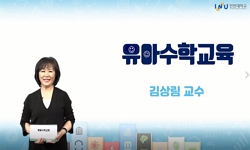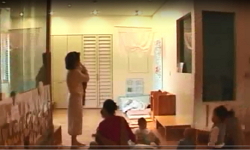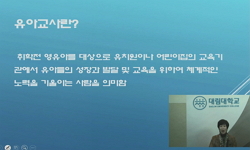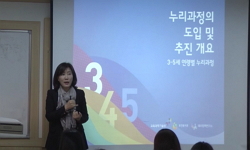본 연구는 유아의 정서능력과 낙관성, 음악능력, 기초언어학습능력 간에 미치는 영향을 분석하는데 목적이 있다. 연구대상은 S시에 위치한 유치원 5곳 만 5세 유아 182명을 대상으로 하였다. ...
http://chineseinput.net/에서 pinyin(병음)방식으로 중국어를 변환할 수 있습니다.
변환된 중국어를 복사하여 사용하시면 됩니다.
- 中文 을 입력하시려면 zhongwen을 입력하시고 space를누르시면됩니다.
- 北京 을 입력하시려면 beijing을 입력하시고 space를 누르시면 됩니다.

유아의 정서능력과 낙관성, 음악능력, 기초언어학습능력 간의 관계분석 = An Analysis of the relationship Between Young Children s Emotional ability, Optimism, Musical ability and Basic language learning ability.
한글로보기https://www.riss.kr/link?id=A106437393
- 저자
- 발행기관
- 학술지명
- 권호사항
-
발행연도
2019
-
작성언어
-
- 주제어
-
KDC
373
-
등재정보
KCI등재
-
자료형태
학술저널
-
수록면
953-982(30쪽)
-
KCI 피인용횟수
0
- DOI식별코드
- 제공처
-
0
상세조회 -
0
다운로드
부가정보
국문 초록 (Abstract)
본 연구는 유아의 정서능력과 낙관성, 음악능력, 기초언어학습능력 간에 미치는 영향을 분석하는데 목적이 있다. 연구대상은 S시에 위치한 유치원 5곳 만 5세 유아 182명을 대상으로 하였다. ‘정서능력’, ‘낙관성’, ‘음악능력’, ‘기초언어학습능력’ 검사 도구를 통해 연구자료를 수집하고, 수집된 자료는 기술통계, Pearson의 적률상관관계, 단계적 회귀분석을 통해 검증하였다. 연구결과 첫째, 유아의 정서능력과 낙관성,음악능력, 기초언어학습능력 간에 유의미한 정적상관이 있는 것으로 나타났다. 둘째, 유아의 정서능력에 대한 낙관성, 음악능력, 기초언어학습능력 간의 상대적 영향력을 분석한 결과, 유아의 낙관성, 음악능력 보다는 기초언어학습능력이 유아의 정서능력을 예측하는 강력한 정적 예측 변인으로 나타났다. 셋째, 유아의 정서능력과 낙관성, 음악능력, 기초언어학습능력 하위요인 간의 상대적 영향력을 분석한 결과, 기초언어 학습능력에서 읽기가 가장 강력한 예측변인으로 나타났으며, 다음으로 낙관성의 하위요인 중 심리적 특질이 예측하는 변인으로 나타났고, 추가적으로 음악능력의 하위요인 중 가락이 유아의 정서능력을 예측하는 변인으로 나타났다.
다국어 초록 (Multilingual Abstract)
The objective of this study was to analyze the relationship between young children s emotional ability, optimism, musical ability and basic language learning ability. The subjects used in this study were 182 young children, who attended kindergartens ...
The objective of this study was to analyze the relationship between young children s emotional ability, optimism, musical ability and basic language learning ability. The subjects used in this study were 182 young children, who attended kindergartens located in S city. The mean age of the subjects was 77.99 months. The study used Berkeley Puppet Interview: BPI , Optimism Test , Kid s Music Aptitude Test: Kid s MAT , Children s Basic Language Learning Ability in collection of data. From the collected data, the mean and the standard deviation were calculated. The collected data were also analyzed using Pearson s correlation and stepwise multiple regression analysis. As a result, there were significantly positive correlation among children s emotional ability, optimism, musical ability and basic language learning ability. Children s basic language learning ability was an effective variable to positively predict emotional ability. In the subscale, Read , which is subfactor of basic language learning ability, and psychological traits which is subfactor of optimism, was the next predictor. Additionally, Melody , which is subfactor of musical ability, was found to be a positive predictable variable affecting emotional ability.
참고문헌 (Reference)
1 지성애, "취학직전 유아 기초학습능력검사도구 개발" 한국교육과정평가원 2015
2 조영옥, "중학생의 낙관성과 정서지능의 관계" 1 : 53-71, 2008
3 오지은, "정서표현동작프로그램이 유아의 정서성, 일상스트레스와 생리적 반응에 미치는 효과" 서울대학교 대학원 2016
4 심재연, "정서기반 유아 음률프로그램 개발 및 효과" 중앙대학교 대학원 2017
5 김주연, "정서경험 군집에 따른 낙관성, 부정적평가의 두려움 및 정서적부적응 행동의 차이: 정서인식 명확성, 정서표현 양가성의 군집 비교" 한국상담학회 15 (15): 145-159, 2014
6 박형신, "음악요소 중심의 감상을 통한 이야기 꾸미기 활동이 유아의 음악적 능력과 이야기 구성능력에 미치는 영향" 한국영유아교원교육학회 16 (16): 289-310, 2012
7 강지은, "음악동화를 활용한 음악교육 활동이 유아의 음악 인지 능력과 정서지능에 미치는 영향" 원광대학교 교육대학원 2015
8 송순옥, "음악과 신체표현을 통합한 예술경험활동이 유아의 정서능력 및 창의적 신체표현에 미치는 효과" 한국아동교육학회 25 (25): 227-245, 2016
9 홍진영, "음악 감상을 통한 표현활동이 유아의 정서지능과 음악능력에 미치는 영향" 한국유아교육ㆍ보육복지학회 14 (14): 347-374, 2010
10 정나영, "유아의 창의성과 음악능력이 음악적 창의성에 미치는 영향" 한국육아지원학회 5 (5): 25-47, 2010
1 지성애, "취학직전 유아 기초학습능력검사도구 개발" 한국교육과정평가원 2015
2 조영옥, "중학생의 낙관성과 정서지능의 관계" 1 : 53-71, 2008
3 오지은, "정서표현동작프로그램이 유아의 정서성, 일상스트레스와 생리적 반응에 미치는 효과" 서울대학교 대학원 2016
4 심재연, "정서기반 유아 음률프로그램 개발 및 효과" 중앙대학교 대학원 2017
5 김주연, "정서경험 군집에 따른 낙관성, 부정적평가의 두려움 및 정서적부적응 행동의 차이: 정서인식 명확성, 정서표현 양가성의 군집 비교" 한국상담학회 15 (15): 145-159, 2014
6 박형신, "음악요소 중심의 감상을 통한 이야기 꾸미기 활동이 유아의 음악적 능력과 이야기 구성능력에 미치는 영향" 한국영유아교원교육학회 16 (16): 289-310, 2012
7 강지은, "음악동화를 활용한 음악교육 활동이 유아의 음악 인지 능력과 정서지능에 미치는 영향" 원광대학교 교육대학원 2015
8 송순옥, "음악과 신체표현을 통합한 예술경험활동이 유아의 정서능력 및 창의적 신체표현에 미치는 효과" 한국아동교육학회 25 (25): 227-245, 2016
9 홍진영, "음악 감상을 통한 표현활동이 유아의 정서지능과 음악능력에 미치는 영향" 한국유아교육ㆍ보육복지학회 14 (14): 347-374, 2010
10 정나영, "유아의 창의성과 음악능력이 음악적 창의성에 미치는 영향" 한국육아지원학회 5 (5): 25-47, 2010
11 지성애, "유아의 지적능력과 공감능력, 적응기술, 낙관성 간의 관계 분석" 한국어린이문학교육학회 19 (19): 359-376, 2018
12 이옥경, "유아의 정서지식과 사회적 능력 및 기초학습능력의 관계에 대한 구조분석 및 단기종단연구" 계명대학교 대학원 2014
13 박지은, "유아의 정서조절능력 증진을 위한 음악활동 프로그램 개발 연구" 한국음악치료학회 14 (14): 1-30, 2012
14 배율미, "유아의 의도적 통제 및 정서적 반응성과 기초학습 능력의 관계" 한국영유아교원교육학회 22 (22): 275-295, 2018
15 정진화, "유아의 음악능력과 창의성, 인지능력 간의 관계 분석" 한국영유아교원교육학회 21 (21): 239-260, 2017
16 지성화, "유아의 언어이해력과 창의성, 공감능력 및 낙관성 간의 관계 분석" 한국교육문제연구소 36 (36): 221-244, 2018
17 김상겸, "유아의 신체·정서능력 증진을 위한 통합프로그램의 개발 및 효과" 한국유아교육학회 38 (38): 29-64, 2018
18 박금주, "유아의 낙관성과 정신상태 용어 및 이야기구조 발달과의 관계" 계명대학교 교육대학원 2010
19 송수희, "유아의 기초학습능력과 유아의 또래유능성 및 학습관련 사회적 기술간 관계" 한국유아교육학회 32 (32): 163-179, 2012
20 지성애, "유아의 기초학습능력과 내재화ㆍ외현화 문제행동, 적응기술 및 창의성 간의 관계 분석" 한국영유아교원교육학회 22 (22): 249-274, 2018
21 손상희, "유아의 기질과 어머니의 양육태도가 유아의 낙관성에 미치는 효과: 어머니의 긍정적 정서표현을 매개로" 미래유아교육학회 21 (21): 183-207, 2014
22 김남희, "유아기초학습능력검사 개발을 위한 탐색" 한국열린유아교육학회 9 (9): 261-284, 2004
23 손상희, "유아교육에서의 낙관성 방향" 2 (2): 51-63, 2015
24 김영연, "유아 정서지능과 기질이 음악적 창의성에 미치는 영향" 한국음악교육학회 40 (40): 161-183, 2011
25 현경실, "유아 음악적성검사" 인싸이트 2016
26 최선영, "연령에 따른 환상적인 낙관적 믿음의 차이와 학령전기 아동의 심리적 적응과의 관계" 서울대학교 대학원 2007
27 신애선, "악기가 그려진 명화를 활용한 음악활동이유아의 정서지능과 미술감상능력에 미치는 효과" 학습자중심교과교육학회 18 (18): 573-592, 2018
28 Hooper. J., "아이의 행복플로리시 [What children need to be happy, confident and successful]" 물푸레 2013
29 이경연, "스토리텔링을 통한 장단놀이 활동이 만 3세 유아의 음악표현력, 언어표현력 및 놀이성에 미치는 효과" 한국영유아교원교육학회 23 (23): 183-207, 2019
30 유애정, "숲체험을 통한 생태유아교육 프로그램이 유아의 정서지능에 미치는 영향" 광주여자대학교 교육대학원 2014
31 최금숙, "숲 체험활동이 어린이집 유아의 사회정서 발달에 미치는 효과" 한국유아교육ㆍ보육복지학회 17 (17): 25-46, 2013
32 이경화, "숲 체험을 포함한 생태중심유아교육프로그램이 유아의 정서지능에 미치는 영향" 경기대학교 교육대학원 2012
33 박은영, "반응적 상호작용에 기초한 유아음악교육 프로그램 개발 및 효과" 한국유아교육학회 32 (32): 181-208, 2012
34 박소연, "달크로즈 음악활동이 유아의 신체표현능력과 사회·정서 발달에 미치는 효과" 한국아동교육학회 23 (23): 175-197, 2014
35 유계환, "낙관성이 학업자아개념에 미치는 영향: 교우관계, 교사와의 관계의 매개효과" 사단법인 아시아문화학술원 10 (10): 559-574, 2019
36 김민정, "낙관성이 심리적 안녕감에 미치는 영향 : 인지적 정서조절전략과 사회적 지지를 매개 변인으로" 가톨릭대학교 대학원 2006
37 Ensor, R., "‘You feel sad?’emotion understanding mediates effects of verbal ability and mother–child mutuality on prosocial behaviors : Findings from 2 years to 4 years" 20 (20): 93-110, 2011
38 Lockhart, K. L., "Young children’s beliefs about the stability of traits : Protective optimism?" 73 (73): 1408-1430, 2002
39 Bassett, H. H., "The structure of preschoolers' emotion knowledge : Model equivalence and validity using a structural equation modeling approach" 23 : 259-279, 2012
40 Cook, E. T., "The relations between emotional understanding, intellectual functioning, and disruptive behavior problems in elementary-school-aged children" 22 (22): 205-219, 1994
41 Baek, J., "The effects of music instruction using picture books and creative activities on musical creativity, music aptitude, and reading ability of young children" UMI 70 (70): 2009
42 Corina, V., "The effectiveness of a new music education program in Cyprus" St. Louis University 2013
43 Gnepp, J., "The development of personalized inferences: Understanding other people's emotional reactions in light of their prior experiences" 1455-1464, 1985
44 Eccles, J. S., "The development of children ages 6 to 14" 9 (9): 30-44, 1999
45 Gerardi, G. M., "The development of affective responses to modality and melodic contour" 12 : 279-290, 1995
46 Trollinger, V. L., "The brain in singing and language" 23 (23): 20-23, 2010
47 Garner, P. W., "The associations of emotion knowledge and teacher-child relationships to preschool children's school-related developmental competence" 29 : 89-100, 2008
48 Hebert-Myers, H., "The Importance of Language, Social, and Behavioral Skills Across Early and Later Childhood as Predictors of Social Competence With Peers" 10 (10): 174-187, 2006
49 Lyubomirsky, S., "The How of Happiness" Sphere 2007
50 Garner, P. W., "Social competence among low‐income preschoolers : Emotion socialization practices and social cognitive correlates" 65 (65): 622-637, 1994
51 Cassidy, T., "Social background, achievement, motivation, optimism and health : A longitudinal study" 13 : 399-412, 2000
52 Ek, E., "Social and developmental predictors of optimism from infancy to early adulthood" 69 : 219-224, 2004
53 House, R., "Regulatory contributors to children's academic achievement" 74 (74): 101-119, 2003
54 Robelen, E. W., "President's panel wants arts studies expanded" 30 (30): 5-, 2011
55 Coolahan, K., "Preschool peer interactions and readiness to learn : Relationships between classroom peer play and learning behaviors and conduct" 92 (92): 458-, 2000
56 Denham, S. A., "Preschool emotional competence: Pathway to social competence?" 74 (74): 238-256, 2003
57 Kastner, M., "Perception of the Major/Minor distinction IV : Emotional connotations in young children" 8 (8): 189-202, 1990
58 Lim, S. A., "Parental emotional support and adolescent happiness : Mediating roles of self-esteem and emotional intelligence" 10 (10): 631-646, 2015
59 Carver, C. S., "Optimism, pessimism, and postpartum depression" 11 (11): 449-462, 1987
60 Nichols, K. L., "Music moments to teach academics" Tree Frog Productions/Kerri-oke Publications 2001
61 Olson, T. L., "Music and learning with students in Early Childhood Special Education in the Kindergarten Classroom. Master of Science in Special Education Action Research Project" Southwest Minnesota State University 2009
62 Telesco, P. J., "Music and early literacy" 2010 (2010): 2010
63 Mostow, A. J., "Modeling emotional, cognitive, and behavioral predictors of peer acceptance" 73 (73): 1775-1787, 2002
64 Cooper, S., "Lighting up the brain with songs and stories" 23 (23): 24-30, 2010
65 Fielding, M., "Leadership, radical student engagement and the necessity of person‐centred education" 9 (9): 299-313, 2006
66 Trentacosta, C. J., "Kindergarten children’s emotion competence as a predictor o f their academic competence in first grade" 7 (7): 77-88, 2007
67 OECD, "How's Life? 2017. OECD 정책브리핑"
68 Halberstadt, A. G., "Handbook of communication science, 2" 93-128, 2013
69 Dodge, K. A., "Handbook of child psychology: Social, emotional, and personality development" John Wiley & Sons 719-788, 2006
70 World Economic Forum, "Generation AI Establishing Global Standards for Children and AI" 10 (10): 1-18, 2019
71 Dunsmore, J. C., "Gender-specific linkages of affective social competence with peer relations in preschool children" 19 (19): 211-237, 2008
72 Denham, S. A., "Encyclopedia on early childhood development" George Manson University 2011
73 Damasio, A. R., "Emotions and feelings" Cambridge University Press 49-57, 2004
74 Tenenbaum, H. R., "Emotional understanding in Quechua children from an agro-pastoralist village" 28 (28): 471-478, 2004
75 Garner, P. W., "Emotional competence, emotion socialization, and young children's peer-related social competence" 12 (12): 29-48, 2001
76 Garner, P. W., "Emotional competence and its influences on teaching and learning" 22 (22): 297-321, 2010
77 Izard, C., "Emotion knowledge as a predictor of social behavior and academic competence in children at risk" 12 : 18-23, 2001
78 Velazquez-Martin, B. M., "Emotion Regulation and Academic School Readiness: Examining Preschool Relations and Considering the Impact of Arts Enrichment for Economically Disadvantaged Children" West Chester University 2013
79 Andrews, L. J., "Effects of an integrated reading and music instructional approach on fifth-grade students’ reading achievement, reading aptitude, music achievements, and music attitude" UMI 58 (58): 1997
80 Barber, S. M., "Effective practices for cultivating strong social and emotional competencies in students from a racially and economically diverse setting" ProQuest Information & Learning 75 : 2015
81 Fisher, D., "Early language learning with and without music" 42 (42): 39-49, 2001
82 Goleman, D., "EQ 감성지능" 웅진씽크빅 2014
83 Scheier, M. F., "Distinguishing optimism from neuroticism(and trait anxiety, self-mastery, and self-esteem) : a reevaluation of the Life Orientation Test" 67 (67): 1063-, 1994
84 Cunningham, J. G., "Developmental change in the understnding of affective meaning in music" 12 : 399-413, 1988
85 Mayeux, L., "Development of social problem solving in early childhood : Stability, change, and associations with social competence" 164 (164): 153-173, 2003
86 Breen, T. V., "Developing Social and Emotional Skills in Early Childhood Instruction: A Delphi Study" Brandman University 2018
87 Sigman, M., "Continuity and change in the social competence of children with autism, down syndrome, and developmental delays" 74 : 1869-1880, 1999
88 Oliver, R. L., "Cognitive, affective, and attribute bases of the satisfaction response" 20 (20): 418-430, 1993
89 Saarni, C., "Children's understanding of emotion" CUP Archive 1991
90 Denton, K., "Children's reading and mathematics achievement in kindergarten and first grade" DIANE Publishing 2002
91 Castro, V. L., "Children's emotion understanding is multidimensional and contextual" North Carolina State University 2015
92 Schultz, D., "Children's emotion processing : Relations to emotionality and aggression" 16 (16): 371-387, 2004
93 Benson, H. P., "Children's Dispositional Optimism and Pessimism: Social and Emotional Outcomes" Seattle Pacific University 2008
94 Blair, C., "Biological processes in prevention and intervention : The promotion of self-regulation as a means of preventing school failure" 20 (20): 899-911, 2008
95 Mursaleen. M., "Associations of intellectual ability with emotional intelligence academic achievement and aggression of Adolescents" 12 : 344-350, 2016
96 Measelle, J. R., "Assessing young children's views of their academic, social, and emotional lives : An evaluation of the self‐perception scales of the Berkeley Puppet Interview" 69 (69): 1556-1576, 1998
97 Fantuzzo, J. W., "An investigation of preschool classroom behavioral adjustment problems and socialemotional school readiness competencies" 20 (20): 259-275, 2005
98 Oh, J. H., "An exploratory study of children's musical experience: visual representations of emotional responses to music" Columbia University 2006
99 Dolgin, K. G., "Age changes in the ability to interpret affect in sung and instrumentally-presented melodies" 18 (18): 87-98, 1990
100 Halberstadt, A. G., "Affective social competence" 10 : 79-119, 2001
101 Castro, V. L., "A three‐factor structure of emotion understanding in third‐grade children" 25 (25): 602-622, 2016
102 Steed, L. G., "A psychometric comparison of four measures of hope and optimism" 62 : 466-482, 2002
103 Kratus, J., "A developmental study of children's interpretation of emotion in music" 21 : 3-19, 1993
104 Denham, S. A., ""I Know How You Feel" : Preschoolers' emotion knowledge contributes to early school success" 13 (13): 252-262, 2015
동일학술지(권/호) 다른 논문
-
자기주도 학습능력 증진을 위한 영화와 글쓰기 활용 PBL 프로그램 개발 및 효과성 검증
- 학습자중심교과교육학회
- 최경민(Choi, Kyeong-Min)
- 2019
- KCI등재
-
- 학습자중심교과교육학회
- Kim, Jungyin(김정인)
- 2019
- KCI등재
-
예비유아교사의 공감능력과 자아탄력성이 교사효능감에 미치는 영향
- 학습자중심교과교육학회
- 백승선(Baek, SeungSeon)
- 2019
- KCI등재
-
전문대 유아교육과 학생들의 핵심역량 변화에 대한 종단적 연구: B대학교 유아교육과를 중심으로
- 학습자중심교과교육학회
- 황지원(Hwang, Jiwon)
- 2019
- KCI등재
분석정보
인용정보 인용지수 설명보기
학술지 이력
| 연월일 | 이력구분 | 이력상세 | 등재구분 |
|---|---|---|---|
| 2027 | 평가예정 | 재인증평가 신청대상 (재인증) | |
| 2021-01-01 | 평가 | 등재학술지 유지 (재인증) |  |
| 2018-01-01 | 평가 | 등재학술지 유지 (등재유지) |  |
| 2015-01-01 | 평가 | 등재학술지 유지 (등재유지) |  |
| 2011-01-01 | 평가 | 등재학술지 유지 (등재유지) |  |
| 2008-01-01 | 평가 | 등재학술지 선정 (등재후보2차) |  |
| 2007-01-01 | 평가 | 등재후보 1차 PASS (등재후보1차) |  |
| 2006-01-06 | 학술지명변경 | 외국어명 : Journal of Learner-Centered Curriculum and Instruction -> The Journal of Learner-Centered Curriculum and Instruction |  |
| 2006-01-01 | 평가 | 등재후보학술지 유지 (등재후보1차) |  |
| 2004-01-01 | 평가 | 등재후보학술지 선정 (신규평가) |  |
학술지 인용정보
| 기준연도 | WOS-KCI 통합IF(2년) | KCIF(2년) | KCIF(3년) |
|---|---|---|---|
| 2016 | 1.29 | 1.29 | 1.31 |
| KCIF(4년) | KCIF(5년) | 중심성지수(3년) | 즉시성지수 |
| 1.37 | 1.42 | 1.436 | 0.33 |





 스콜라
스콜라






